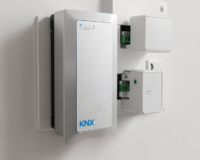In the rapidly evolving world of smart home and building automation, KNX technology has established itself as a leading standard. KNX offers a robust, scalable, and versatile solution for controlling various systems, including lighting, HVAC, security, and more. As the demand for smart buildings increases, so does the need for professionals who are skilled in designing, installing, and maintaining KNX systems. This is where KNX certification comes into play. Becoming a certified KNX partner not only validates your expertise in this technology but also opens doors to numerous opportunities in the field of smart home and building automation.
The Importance of KNX Certification
Industry Recognition and Credibility
KNX certification is recognized globally as a mark of proficiency in smart building technology. It signifies that an individual or a company has the necessary skills and knowledge to work with KNX systems. This certification is particularly valuable for professionals such as electricians, system integrators, and automation engineers who wish to demonstrate their expertise in the industry. Being a certified KNX partner enhances your credibility with clients and employers, giving you a competitive edge in the market.
Access to the Global KNX Network
As a certified KNX partner, you gain access to a vast network of professionals and companies around the world. This network provides opportunities for collaboration, knowledge exchange, and business growth. You can participate in KNX events, workshops, and forums, where you can learn from industry leaders and share your experiences with peers. Additionally, certified partners are listed in the official KNX Partner Database, which is a valuable resource for clients seeking qualified KNX professionals.
Ensuring High-Quality Installations
KNX certification ensures that installations are carried out to the highest standards. The training and certification process equips professionals with the skills to design, program, and maintain KNX systems effectively. This not only results in high-quality installations but also minimizes the risk of errors and reduces the likelihood of system failures. Clients who hire certified KNX partners can have confidence that their projects will be executed with precision and professionalism.
How to Become a Certified KNX Partner

KNX Association offers companies who have specialized in the KNX technology the possibility to become a KNX Partner. This can be attained by taking a basic course (and passing the final exam) at a KNX Certified Training Centre.
You can easily register for a certified course through your MyKNX account.
1. Learn About KNX Technology
Start by understanding the basics of KNX technology and its role in smart home and building automation. A background in electrical engineering or building systems is helpful but not mandatory.
2. Enroll in a KNX Basic Course
Sign up for a KNX Basic Course at an accredited KNX Certified Training Center. These courses are available both in-person and online and cover the foundational aspects of KNX, including system architecture, communication methods, and device configuration.
3. Complete the Course
Participate actively in both the theoretical and practical components of the course. The training usually lasts five days and includes hands-on exercises that help you gain practical experience with KNX systems.
After successfully completing a course, you’ll earn a certificate that certifies your expertise. KNX offers four certification levels:
- KNX Basic Course
- KNX Advanced Course
- KNX Tutor Course
- KNX HVAC Specialist Course
4. Pass the Certification Exam
After completing the course, you’ll need to pass a certification exam. The exam consists of two parts: a theoretical test to assess your understanding of KNX principles and a practical test where you demonstrate your ability to program and configure a KNX system.
5. Receive Your KNX Partner Certificate
Upon passing the exam, you will be awarded the KNX Partner Certificate. This certification confirms your expertise in KNX technology and officially recognizes you as a Certified KNX Partner.
Earning a certificate not only enhances your technical skills but also increases your visibility in the industry. As a certified KNX professional, you’ll be featured as an official KNX Partner on KNX website, advancing both your technical and commercial career opportunities.
6. Join the KNX Partner Network
Once certified, your details will be listed in the KNX Partner Database, making it easier for clients and employers to find you. You will also become part of a global network of KNX professionals, offering opportunities for networking, collaboration, and ongoing learning.
7. Continue Your Professional Development
Consider advancing your skills by taking additional KNX courses, such as the KNX Advanced Course. Staying updated with the latest developments in KNX technology will help you maintain your certification and enhance your career prospects.
By following these steps, you can become a Certified KNX Partner and gain the skills and recognition needed to succeed in the smart building and home automation industry.
The Certification Pathway

To become a certified KNX partner, individuals must complete a structured training program at KNX Certified Training Centre and pass an examination. The certification pathway is designed to cater to different levels of expertise, from beginners to advanced professionals. The key stages in the certification process are:
- KNX Basic Course: This is the entry-level course that provides a comprehensive introduction to KNX technology. It covers the fundamentals of KNX, including the architecture, communication protocols, and basic configuration techniques. The course typically includes both theoretical lessons and hands-on practical exercises. Upon completion of the course, participants must pass a theoretical and practical exam to receive the KNX Partner Certificate.
- KNX Advanced Course: After obtaining the Basic Certificate, individuals can enroll in the KNX Advanced Course. This course delves deeper into KNX programming and system design. It covers advanced topics such as HVAC control, security systems integration, and energy management. The advanced course also includes more complex practical exercises, allowing participants to gain hands-on experience with sophisticated KNX installations. A final exam is required to obtain the KNX Advanced Certificate.
- KNX Tutor Course: For professionals who wish to train others in KNX technology, the KNX Tutor Course is available. This course is designed for experienced KNX professionals who want to become certified trainers. It covers teaching methodologies, course content delivery, and assessment techniques. Successful completion of the Tutor Course allows individuals to conduct KNX certification courses and examinations.
- KNX HVAC Specialist Course: This specialized course is aimed at professionals looking to focus on the integration of KNX technology with heating, ventilation, and air conditioning systems. It covers the specific requirements and best practices for controlling HVAC systems via KNX. Completion of this course and certification makes you a recognized expert in KNX-based HVAC solutions, opening doors to specialized roles and projects
Prerequisites for Certification
While there are no strict prerequisites for enrolling in the KNX Basic Course, it is recommended that participants have a background in electrical engineering or a related field. Basic knowledge of building automation systems and experience with electrical installations will be beneficial. For the Advanced Course, participants must have successfully completed the Basic Course and possess a valid KNX Partner Certificate. The Tutor Course is intended for individuals who have completed both the Basic and Advanced Courses and have substantial experience in KNX installations.
The Certification Exam
The certification exam is a crucial component of the KNX certification process. It tests the knowledge and skills acquired during the training courses. The exam typically consists of two parts: a theoretical test and a practical test.
- Theoretical Test: This part of the exam assesses the participant’s understanding of KNX technology, system design principles, and programming techniques. It includes multiple-choice questions, short answer questions, and problem-solving scenarios. The theoretical test ensures that participants have a solid grasp of the key concepts covered in the course.
- Practical Test: The practical test evaluates the participant’s ability to apply their knowledge in real-world scenarios. Participants are required to configure and program a KNX installation based on specific requirements. This may involve tasks such as setting up a lighting control system, integrating HVAC components, or implementing energy management features. The practical test ensures that participants can competently carry out KNX installations.
Available KNX Training Courses and Resources
KNX Basic Course
The KNX Basic Course is the foundation of KNX training. It provides a thorough introduction to the KNX standard, covering essential topics such as:
- KNX System Overview: Understanding the architecture and components of a KNX system.
- KNX Communication: Learning about the various communication media used in KNX, including TP (Twisted Pair), RF (Radio Frequency), and IP (Internet Protocol).
- ETS Software: An introduction to Engineering Tool Software (ETS), the primary tool used for programming and configuring KNX systems.
- Device Configuration: Practical exercises on how to configure KNX devices, including sensors, actuators, and controllers.
- Project Design: Basic principles of designing a KNX project, including system topology, device selection, and integration with other systems.
The Basic Course typically spans five days and concludes with the certification exam. It is offered by numerous KNX training centers worldwide, both in-person and online.
KNX Advanced Course
Building on the knowledge gained in the Basic Course, the KNX Advanced Course covers more complex aspects of KNX technology. Key topics include:
- Advanced Programming Techniques: Deep dive into KNX programming, including the use of advanced ETS functions.
- HVAC Integration: Configuring KNX systems for controlling heating, ventilation, and air conditioning.
- Lighting and Shading Control: Advanced methods for controlling lighting and motorized shading systems using KNX.
- Security Systems: Integrating KNX with alarm systems, access control, and surveillance systems.
- Energy Management: Techniques for optimizing energy consumption and integrating renewable energy sources with KNX.
The Advanced Course also includes extensive hands-on exercises, allowing participants to work on real-world KNX projects. The course typically lasts five days and is followed by the certification exam.
KNX Tutor Course
The KNX Tutor Course is designed for experienced KNX professionals who wish to become certified trainers. The course covers:
- Teaching Methodologies: Best practices for delivering KNX training courses.
- Course Content Delivery: Techniques for presenting complex KNX concepts in an accessible manner.
- Assessment Techniques: How to design and administer effective exams and practical tests.
- KNX Partner Support: Providing guidance and support to KNX partners in their training journey.
The Tutor Course is typically a one-week intensive program that culminates in an assessment of the participant’s teaching abilities.
Additional KNX Training Resources
In addition to the structured training courses, there are various resources available to support KNX learning and professional development:
- Online Courses and Webinars: Many KNX training centers offer online courses and webinars that cover specific topics, such as lighting control, energy management, and security systems. These resources are ideal for professionals who want to deepen their knowledge in specific areas or stay updated on the latest developments in KNX technology.
- KNX eCampus: The KNX Association offers a free online platform called KNX eCampus, where beginners can learn the basics of KNX at their own pace. The platform includes interactive lessons, quizzes, and videos, making it a great starting point for those new to KNX.
- KNX Documentation and Manuals: The KNX Association provides extensive documentation, including user manuals, technical guides, and design handbooks. These resources are invaluable for both beginners and experienced professionals who need detailed information on KNX technology and best practices.
- KNX Forums and Communities: There are several online forums and communities where KNX professionals can discuss challenges, share solutions, and exchange ideas. These platforms are excellent for networking and learning from the experiences of others in the field.
The Benefits of KNX Certification for Your Career
Career Advancement
Obtaining KNX certification can significantly boost your career prospects. Certified KNX partners are in high demand as the adoption of smart building technology continues to grow. Whether you are an electrician, system integrator, or engineer, KNX certification can lead to new job opportunities, promotions, and higher salaries. Employers value the expertise and credibility that come with KNX certification, making it a worthwhile investment in your professional development.
Entrepreneurial Opportunities
For those interested in starting their own business, KNX certification can be a key differentiator. As a certified KNX partner, you can offer specialized services in the design, installation, and maintenance of KNX systems. This can include residential, commercial, and industrial projects. The certification also allows you to tap into the growing market for smart home and building automation, where demand for qualified professionals is on the rise.
Continuous Learning and Development
KNX certification is not a one-time achievement but a pathway to continuous learning and development. The KNX Association regularly updates its standards and introduces new features and capabilities to the technology. As a certified partner, you will have access to the latest training courses, workshops, and resources that keep you informed about these updates. This ensures that your skills remain relevant and that you are always at the forefront of industry advancements.
Conclusion
KNX certification is a valuable credential for professionals in the smart building and home automation industry. It provides a comprehensive pathway for acquiring the skills and knowledge needed to work with KNX systems, from basic installation to advanced programming and integration. Becoming a certified KNX partner not only enhances your credibility and career prospects but also connects you with a global network of professionals and resources.
By investing in KNX certification and training, you position yourself for success in a rapidly growing industry. Whether you are looking to advance your career, start a business, or simply expand your knowledge, KNX certification offers a clear and rewarding path forward.
Read more: Why Choose KNX for Commercial Building Automation?






